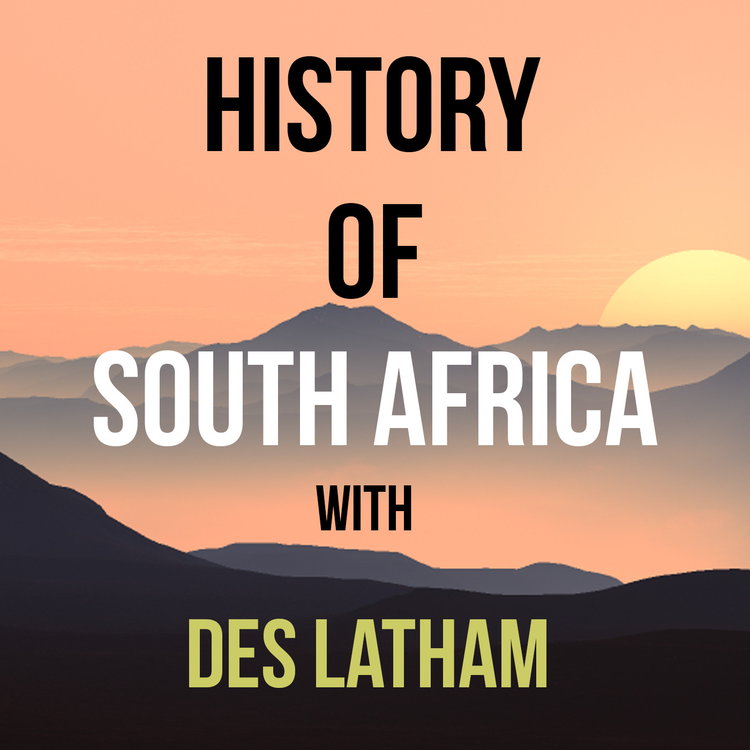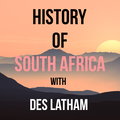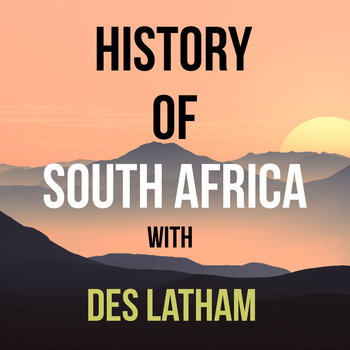
Episode 160 - A tour of Philippolis, an 1844 update, the Great Guano discovery and the Merino sheep miracle
Loading player...
This is episode 160 and we’re breathing the spicy smells of the semi-desert, and taking in the exotic and wonderous scenary of the Richtersveld, Namaqualand, and the stunning area around south westn Free State in the 840s.
Last episode we heard about the period 1840-1843 in the southern Caledon River valley, and how the Voortrekkers like Jan Mocke were flowing into land that Moshoeshoe of the BaSotho believed was his. That was setting up a classic situation where land was the core of the ension.
A lot of what we’re looking at today is centred on a town largely forgotten these days, Philippolis. If you drive along the N1 between Bloemfontein and Colesburg, turn off at Trompsburg and head south west along the R717 for around 45 kilometres. It’s not far from the Orange River, and it’s history is certainly chequered. It’s also the home town of writer and intellectual Laurens van Der Post and former Springbok Rugby player Adriaan Strauss.
On the 22nd October, 1842, the country beyond the Orange River to the north-east of the Cape Colony was proclaimed British Territory and the sphere of operations of the Cape British military garrison was considerably enlarged. The emigrant Boers based in this region reacted with anger, it was Adam Kok the second the Griqualand leader who had requested protection from the British because of the increased numbers of trekkers in his vicinity. Between 1826 when Kok arrived and the 1840, Kok had managed to get along with the Boers, but the Great Trek had changed everything.
The London Missionary Society had founded Philippolis in 1823 as a mission station serving the local Griqua people, named after the man you heard about last episode, Dr John Philip, who was the superintendent of the Society from 1819 to 1849.
Adam Kok II settled in Philippolis with his people in 1826 and became the protector of the mission station, on condition that he promised to protect the San against the aggression of the Boers. Kok was supposed to promote peace in the region, at least that was the brief from the London Missionary Society.
Instead, carnage ensued as the Griqua used Philippolis as a base for a number of deadly commandos against the San people - virtually wiping them out in the area. Ironically, the Griqua worked with Boers to conduct their raids. This violated the agreement made between the London Missionary Society and Adam Kok II and eventually the San were driven out of the area.
When the Voortrekkers began showing up nearby at Colesberg which was one of the main jumping off points of the Great Trek and tension grew between the trekkers and the Griqua.
1844 - like 2024 - was a leap year. And coming up was a momentous moment. In May 24 1844 the first electrical telegram was sent by Samuel Morse from the U.S. Capitol in Washington, D.C. to the B&O Railroad "outer depot" in Baltimore, saying "What hath God wrought”.
Considering that the telegram and later the radio led to television and then social media, perhaps we should all wonder What Hath God wrought.
In June of 1844 the Young Men’s Christian Association was formed, the YMCA, setting off a chain of events culminating in the song of the same name by the Village People. History is not all skop skiet and donder.
Back on the dusty flatlands around Philippolis, Adam Kok and the Boers were blissfully unaware of the significance of all of these births and deaths across the Atlantic Ocean.
Further south, in the Cape, the newly created road boards were hard at work as I mentioned, building new routes out of Cape Town, connecting the Colony to the most important port in the southern hemisphere.
By this point, there were steamships operating between Cape Town and Port Elizabeth, which oftened called in at Mossel Bay.
Other ships began flocking in huge numbers to a bunch of islands off Namaqualand .. the Great Guano Rush had started at the end of 1843 and really got going in 1844. It was discovered that vast deposits of guano on uninhabited island.
Last episode we heard about the period 1840-1843 in the southern Caledon River valley, and how the Voortrekkers like Jan Mocke were flowing into land that Moshoeshoe of the BaSotho believed was his. That was setting up a classic situation where land was the core of the ension.
A lot of what we’re looking at today is centred on a town largely forgotten these days, Philippolis. If you drive along the N1 between Bloemfontein and Colesburg, turn off at Trompsburg and head south west along the R717 for around 45 kilometres. It’s not far from the Orange River, and it’s history is certainly chequered. It’s also the home town of writer and intellectual Laurens van Der Post and former Springbok Rugby player Adriaan Strauss.
On the 22nd October, 1842, the country beyond the Orange River to the north-east of the Cape Colony was proclaimed British Territory and the sphere of operations of the Cape British military garrison was considerably enlarged. The emigrant Boers based in this region reacted with anger, it was Adam Kok the second the Griqualand leader who had requested protection from the British because of the increased numbers of trekkers in his vicinity. Between 1826 when Kok arrived and the 1840, Kok had managed to get along with the Boers, but the Great Trek had changed everything.
The London Missionary Society had founded Philippolis in 1823 as a mission station serving the local Griqua people, named after the man you heard about last episode, Dr John Philip, who was the superintendent of the Society from 1819 to 1849.
Adam Kok II settled in Philippolis with his people in 1826 and became the protector of the mission station, on condition that he promised to protect the San against the aggression of the Boers. Kok was supposed to promote peace in the region, at least that was the brief from the London Missionary Society.
Instead, carnage ensued as the Griqua used Philippolis as a base for a number of deadly commandos against the San people - virtually wiping them out in the area. Ironically, the Griqua worked with Boers to conduct their raids. This violated the agreement made between the London Missionary Society and Adam Kok II and eventually the San were driven out of the area.
When the Voortrekkers began showing up nearby at Colesberg which was one of the main jumping off points of the Great Trek and tension grew between the trekkers and the Griqua.
1844 - like 2024 - was a leap year. And coming up was a momentous moment. In May 24 1844 the first electrical telegram was sent by Samuel Morse from the U.S. Capitol in Washington, D.C. to the B&O Railroad "outer depot" in Baltimore, saying "What hath God wrought”.
Considering that the telegram and later the radio led to television and then social media, perhaps we should all wonder What Hath God wrought.
In June of 1844 the Young Men’s Christian Association was formed, the YMCA, setting off a chain of events culminating in the song of the same name by the Village People. History is not all skop skiet and donder.
Back on the dusty flatlands around Philippolis, Adam Kok and the Boers were blissfully unaware of the significance of all of these births and deaths across the Atlantic Ocean.
Further south, in the Cape, the newly created road boards were hard at work as I mentioned, building new routes out of Cape Town, connecting the Colony to the most important port in the southern hemisphere.
By this point, there were steamships operating between Cape Town and Port Elizabeth, which oftened called in at Mossel Bay.
Other ships began flocking in huge numbers to a bunch of islands off Namaqualand .. the Great Guano Rush had started at the end of 1843 and really got going in 1844. It was discovered that vast deposits of guano on uninhabited island.

